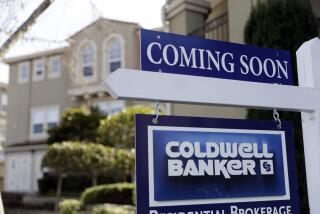Who Should Repair Leak--Association or Owner?
- Share via
QUESTION: I own a condo unit on the third floor of a three-story building. I have a rain leak from a window, and I’m not sure who is responsible for the repair.
The window is the stationary glass door next to the sliding part of the balcony door. It is leaking water from the bottom into the living room.
Is the association responsible for repairing and paying for the cost of the repair?
ANSWER: First, let’s determine if this is a door or a window. From your description, it seems that the leak is occurring at the bottom of the stationary side of a sliding glass door. The stationary door and the sliding door are mounted in the same door frame, so I would consider this to be a door leak, not a window leak. In some associations, windows are treated differently from doors.
Your association’s declaration of covenants, conditions and restrictions may state whether the association or the unit owner is responsible for repair or replacement of doors. If so, your association should rely upon the CC&Rs.;
If owner or association responsibility is not stated in the CC&Rs;, then two sections of the California Civil Code will provide clarification of responsibilities.
Civil Code 1351(i) states the “exclusive use common area” means “a portion of the common areas designated by the declaration for the exclusive use of one or more, but fewer than all, of the owners of the separate interests [units] and which is or will be appurtenant to the separate interest or interests.
(1) Unless the declaration otherwise provides, any shutters, awnings, window boxes, doorsteps, stoops, porches, balconies, patios, exterior doors, door frames and hardware incident thereto, screens and windows or other fixtures designed to serve a single separate interest, but located outside the boundaries of the separate interest, are exclusive use common areas allocated exclusively to that separate interest.
(2) Notwithstanding [in spite of] the provisions of the declaration, internal and external telephone wiring designed to serve a single separate interest, but located outside the boundaries of the separate interest, are exclusive use common areas allocated exclusively to that separate interest.”
To find out who is responsible for repair, replacement or maintenance, refer to Civil Code Section 1364, which states:
“(a) Unless otherwise provided in the declaration of a common interest development, the association is responsible for repairing, replacing or maintaining the common areas, other than exclusive use common area, and the owner of each separate interest [unit] is responsible for maintaining that separate interest and any exclusive use common area appurtenant to the separate interest.”
Depending upon the wording of an association’s CC&Rs;, sometimes the owner will be responsible for a particular repair while another association’s documents might make the association responsible for the repair.
Because I am not an attorney, I cannot give you legal advice. If you or your association needs clarification of the association’s governing documents or the civil codes that pertain to associations, then you should rely on the advice of an attorney whose law practice is focused on the representation of community associations (common interest developments).
After a review of your documents, including the condominium plan if one exists, the attorney will be able to provide an opinion letter that definitively states the repair and maintenance responsibilities of the association and the owners This information will help to prevent disputes about legal responsibilities.
Residents Have Right to Petition
Q: Our board of directors is controlled by the builder-developer of our association because only 40% of the homes have been sold.
The board meetings are held during the day when most owners cannot attend. Letters to the board are not answered. They do not want to hear about any problems that might affect sales activity.
Some of the homeowners recently circulated a petition. The board president sent a letter demanding that the signature-gathering stop.
He stated that the petition was a violation of the provision in the CC&Rs; that prevents “interference with the quiet enjoyment of the occupants.” What are the rights of the homeowners?
A: Even though the developer still owns a majority, the owners have a right to attend meetings, and the board must give the owners an opportunity to speak at the meeting.
You are entitled to receive copies of the minutes, a summary of the minutes or a draft copy within 30 days of a meeting.
In my opinion, circulating a petition is within your rights. Most associations have bylaws that provide for petitioning for the purpose of calling a special meeting of the membership, for instance
If the board prevents you from going door to door, you can submit a written request for the name and address list of all the owners so you can do a mailing to all the owners.
The board must comply with your request, offer an alternative method of communicating with the other owners or state the reason it is denying your request. The board must respond within 10 days.
Don’t do anything radical like staging a demonstration outside the sales office. You should not attempt to interfere with the developer’s ability to sell the homes. As more homes are sold, the homeowners will soon have representation on the board of directors.
*
Hickenbottom is a community association management consultant and a founding director of the California Assn. of Community Managers. She selects questions of general interest for the column and regrets that she cannot respond to all questions received. Send questions to: Condo Q&A;, Box 5068, Thousand Oaks, CA 91360.
More to Read
Inside the business of entertainment
The Wide Shot brings you news, analysis and insights on everything from streaming wars to production — and what it all means for the future.
You may occasionally receive promotional content from the Los Angeles Times.










